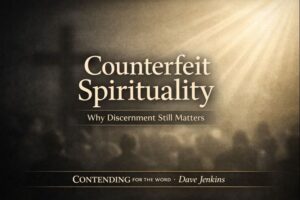⏱️ Estimated Reading Time: 6 min read
Dr. Andreas Köstenberger is the founder of Biblical Foundations™ and Research Professor of New Testament and Biblical Theology and Director of the Center for Biblical Studies at Midwestern Baptist Theological Seminary.
T4L: Thank you very much for agreeing to do this interview with Theology for Life Magazine, Dr. Köstenberger. Can you tell us a bit about yourself, including the current ministries you are involved in?
Dr. Köstenberger: Sure. I grew up in Vienna, Austria, in a Roman Catholic family. Then, as a college student, I had a radical conversion to Christ and immediately sensed a call to Christian ministry. I came to the US to go to seminary, first to Columbia Bible College & Graduate School for Missions, then to Trinity Evangelical Divinity School, and have taught New Testament for the past 25 years. I am passionate about equipping students and pastors for sound preaching and teaching. I also enjoy writing and speaking on topics such as God’s design for man and woman, John’s Gospel, Paul’s letters to Timothy and Titus, hermeneutics, and biblical theology.
T4L: What an awesome testimony and work of God in your life! That said, let’s just dive in here…What are some of the most significant challenges facing biblical interpreters and expositors today as they seek to help God’s people understand the twenty-seven books in the New Testament?
Dr. Köstenberger: I can think of quite a few. Trendiness is one. In my experience, many get bored with solid Bible study and want something more “exciting”. Unfortunately, this often leads to questionable interpretive theories and practices. Something doesn’t have to be new to be true! The same is true for pastoral ministry. Too often, we think we have to compete with those handful of pastors who have a national (or even global) ministry, instead of simply aiming to be faithful to do well what God has called us to do.
Another enemy and potential or real obstacle is busyness. The brutal truth is that many, if not most, of us are simply too busy to make a deep impact on others or even to know God well ourselves. We fool ourselves thinking we can do it all when the truth is we can’t. We need to scale down, and slow down, and streamline our lives and set proper priorities. This includes both studying God’s Word and prayer and (for those who are married) devoting oneself to one’s wife and/or family.
T4L: As you’ve taught future Pastors and ministry leaders, what are some of the biggest lessons, from your vantage point as a Professor of New Testament, which Bible College and Seminary students should aim to learn while they are in school to prepare them for a life of service in the Kingdom of the Lord Jesus?
Dr. Köstenberger: One priority would be for them to develop solid study habits, as well as excellent research and writing skills. This includes being able to survey the state of research in a given field and to argue a thesis compellingly by marshaling all the relevant evidence, with confidence yet humility.
Another priority would be to develop a good rhythm of life with a healthy balance between personal life and family on the one hand, and work and ministry on the other. I’ve tried to address some of these matters in my book Excellence: The Character of God and the Pursuit of Scholarly Virtue.
T4L: Great insight on that! I hope many will take your words to heart (and practice). As many reading this already know, you are a recognized expert on the Gospel of John. Let’s say a Pastor or Bible study leader has decided to begin to preach or teach through this Gospel. In your experience, what is critical to understand as one begins to study and teach through this Gospel?
Dr. Köstenberger: I love John’s Gospel because it is so profound theologically and deepens our understanding of who Christ is. No wonder a Church Father called it “the spiritual Gospel”! I’d recommend reading through the Gospel multiple times and taking notes on any pertinent observations. That way you can get a good feel for the Gospel as a whole. Perhaps my survey, Encountering John (Baker, 2013), could be of help here.
After this, I’d divide up the Gospel into preaching units, depending on how many sermons you plan to devote to preaching through the book. I’d also consult a good resource on the theology of John’s Gospel. I’ve tried to provide such a resource in A Theology of John’s Gospel and Letters (Zondervan, 2009).
Then, in preparing individual sermons, keep in mind that John wrote his Gospel to instill faith in his readers that Jesus is the Messiah. The various narratives, signs, monologues, and dialogues in the Gospel all serve this overarching purpose. So, preach each sermon to answer the question, “Who is Jesus?” and aim to deepen the faith of the people in your congregation or to stir first-time faith in those who are still seeking for answers.
T4L: As you know, the problem of biblical illiteracy is a growing one. How would you like to see Pastors and ministry leaders address this growing challenge?
Dr. Köstenberger: Well, as a seminary professor, I’d say, encourage people to go to seminary if at all possible. There is no substitute for formal education, especially in the area of biblical languages and hermeneutics. Also, in my ministry with Biblical Foundations (www.biblicalfoundations.org), and now in preparing to launch the Center for Biblical Studies at Midwestern, I’ve tried to make scholarship accessible to serious students of the Bible. This also includes several new courses on the TGC website on topics, such as hermeneutics or Christian parenting.
It has never been easier to access solid, high-quality biblical content, which is very encouraging. The only problem is that so many voices are clamoring for our attention, which means we need to stay focused and be discerning in choosing quality content. I’m hopeful that we can raise up a new generation of believers who know God’s Word well and have a passion to teach it to the next generation. In this regard, a commitment to mentoring and discipleship will be key. This is what Jesus did when He spent most of His earthly life training a small group of followers in-depth for ministry.
T4L: Wonderful points! Thank you so much for taking time out of your busy schedule to do this interview, Dr. Kostenberger!
Dave Jenkins is happily married to his wife, Sarah. He is a writer, editor, and speaker living in beautiful Southern Oregon. Dave is a lover of Christ, His people, the Church, and sound theology. He serves as the Executive Director of Servants of Grace Ministries, the Executive Editor of Theology for Life Magazine, the Host and Producer of Equipping You in Grace Podcast, and is a contributor to and producer of Contending for the Word. He is the author of The Word Explored: The Problem of Biblical Illiteracy and What To Do About It (House to House, 2021), The Word Matters: Defending Biblical Authority Against the Spirit of the Age (G3 Press, 2022), and Contentment: The Journey of a Lifetime (Theology for Life, 2024). You can find him on Facebook, Twitter, Instagram, Youtube, or read his newsletter. Dave loves to spend time with his wife, going to movies, eating at a nice restaurant, or going out for a round of golf with a good friend. He is also a voracious reader, in particular of Reformed theology, and the Puritans. You will often find him when he’s not busy with ministry reading a pile of the latest books from a wide variety of Christian publishers. Dave received his M.A.R. and M.Div through Liberty Baptist Theological Seminary.




